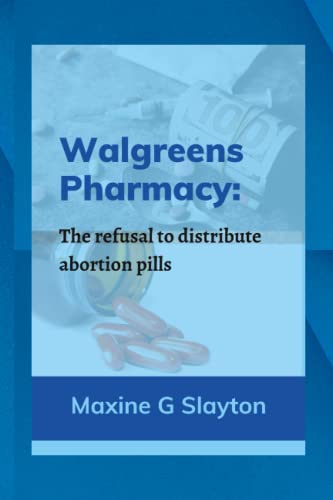WALGREENS PHARMACY
The refusal to distribute abortion pills
Maxine G. Slayton
BOOK REVIEW

In the current landscape of American healthcare, few subjects ignite as fierce a debate as abortion. In her thought-provoking work, Walgreens Pharmacy: The Refusal to Distribute Abortion Pills, Maxine G. Slayton dives headfirst into this controversial ocean, uncovering layers of corporate ethics, personal beliefs, and governmental policies that shape the narrative of reproductive rights in our society. This isn't just a book; it's a call to arms, a challenge to recognize the implications of corporate decisions that resonate far beyond boardrooms into the very core of individual lives.
Slayton meticulously examines Walgreens Pharmacy's refusal to distribute abortion pills, a stance that has polarized public opinion and catalyzed protests across the nation. She masterfully explores how the pharmacy's decision reflects broader societal attitudes towards women's health and autonomy, delving into the tangled web of legislation, religion, and economics that form the backdrop of this contentious issue. With an unflinching gaze, she holds a mirror to a society grappling with its values, forcing us to confront uncomfortable truths about choice and control.
Readers are thrown into a passionate debate as they navigate Slayton's insights. Her analysis doesn't shy away from the visceral emotions surrounding the topic; it provokes rage, solidarity, and compassion. The dialogues she presents are not merely academic; they pulse with urgency, reflecting real lives impacted by these corporate policies. Slayton's eloquent prose strips away the sterile language often used in discussions of abortion, replacing it with the raw voice of women fighting for their rights.
Critics of Slayton's work may argue that her approach is too one-sided, lacking the comprehensive viewpoint necessary to tackle such a divided issue. Yet, it is precisely this passionate advocacy that makes her work resonate with those who have felt the direct impact of these policies. Readers have shared their thoughts, some praising her for being a champion of women's rights, while others caution against the emotional weight she brings to the discussion. This dichotomy speaks volumes about the societal division surrounding reproductive health.
Moreover, Slayton's narrative does not exist in a vacuum. It intertwines with a larger historical context-the ongoing struggle for women's rights, the evolving landscape of pharmaceutical ethics, and the varied interpretations of personal and societal obligations towards reproductive health. As you journey through her exploration, you can't help but feel the weight of history pressing down on contemporary discourse, urging you-even demanding you-to reconsider where you stand.
The call for awareness that emanates from Walgreens Pharmacy: The Refusal to Distribute Abortion Pills is deafening. It is a reminder of the power corporations wield and the significant responsibility that comes with it-whether to uplift or undermine individual rights. As Slayton shines a light on these moral quandaries, she invites each of us to partake in the dialogue and, perhaps more importantly, to act.
As you set this book down, take a moment to reflect. What side of this debate will you stand on? Will you remain a silent observer, or will you provoke change? Slayton's work offers a pathway towards understanding, urging you not to overlook the complexities woven into this fabric of human rights. Engage with it deeply, passionately, and remember: your voice matters. 🌍
📖 WALGREENS PHARMACY: The refusal to distribute abortion pills
✍ by Maxine G. Slayton
🧾 28 pages
2023
#walgreens #pharmacy #refusal #distribute #abortion #pills #maxine #slayton #MaxineGSlayton